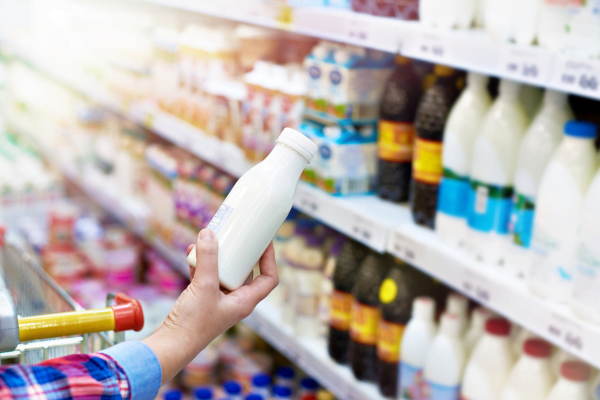We are often told that milk and milk products are important for our daily diet and it is the only source of calcium. We have come across a lot of myths about milk and milk products such as having dairy makes your bones stronger, milk is the best source of protein, it helps in weight loss, it is the only source of vitamin D, full-fat dairy is unhealthy, and milk is very important for growth and development in children.
One of the common myths we have heard is ‘everyone can tolerate milk’. But the real question is do we really need dairy in our diets? Is it the only source of calcium, vitamin D, and other nutrients?
In this blog, we are decoding the question: Do we really need dairy in our diets?
What is dairy?
Dairy and dairy products refer to food that contains milk. The milk used in the food can be from any mammal such as cow, goat, sheep, and buffalo.
Milk or dairy products that are lactose-free are yogurt/curd, paneer, ghee, butter, cheese, and kefir. Ice cream, cream, sour cream, cream cheese, and whey products are a few examples of products that contain milk.
Milk is processed into various products such as semi-skimmed milk, skimmed milk, evaporated or powdered milk. Fat is removed in percentage to produce a range of low-fat milk – 1% milk, 2% milk, and full-fat milk.
Milk is a perishable product, and it also has a lot of microorganisms present in it. It can only be packed and sold for public use with primary treatment. Milk is pasteurised (high-temperature treatment done for a few seconds to kill or inhibit the growth of microorganisms).
Global milk consumption
The Indian population is the largest milk consumption country followed by the European Union. The Philippines population is the last on the list that consumes milk.
Prevalence of lactose intolerance
Lactose intolerance is a condition in which the body lacks the enzyme – lactase, that digests lactose. When lactose is not digested it causes abdominal bloating, pain, loose stools, nausea, flatulence, and gurgling noise from the intestine (caused by the movement of fluid and gas).
A report shows lactose intolerance is common in Asian countries. About 70-100% of the people have symptoms of lactose intolerance in Eastern Asia. It is least commonly found in Northern and Central European countries, about 5% of the population is intolerant of lactose.
Nutritional value of milk
Nutritional value of milk for 100ml* (Indian recommendation)
| Cow | Goat | Buffalo |
Energy | 72.9kcal | 69g | 107.3kcal |
Protein | 3.26g | 3.6g | 3.68g |
Carbohydrates | 4.94g | 4.3g | 8.39g |
Fats | 4.48g | 4.5g | 6.58g |
Calcium | 118mg | 134mg | 121mg |
Vitamin D | 1.22mcg | 2.3mcg | 1.63mcg |
*These values can vary depending on the sample
The nutritional composition of cow milk contains all 3 macronutrients – carbohydrates, proteins, and fats. It contains both insoluble and soluble milk proteins. Casein is the major protein, it helps in increasing the absorption of minerals. Studies show that grass-fed cow milk has more omega-3 than conventionally raised cows. The fat composition of milk heavily depends on the processing and treatments.
Milk also has a good amount of vitamins and minerals that are beneficial for growth and development. Vitamin B12, calcium, riboflavin, and phosphorus are available in abundance.
Cow milk is fortified with vitamins and minerals that are lost during processing.
Benefits of milk for humans
Milk is a multi-nutrient food and is easily accessible. It also has many beneficial effects for humans.
- Bone health – Milk is a good source of calcium and protein. Bones need calcium and protein for growth and development. Milk is fortified with vitamin D which helps calcium absorption.
- Heart health – Potassium helps lower blood pressure by dilating the blood vessels and reducing the risk of heart disease and stroke. A good source of potassium is milk.
- Protection against cancer – Calcium and vitamin D present in milk helps in the protection against cancer. Calcium protects the gut lining, reducing the risk of colon, rectum, and prostate cancer. Vitamin D plays a role in cell growth regulation, this helps in reducing the risk of colic, prostate, and breast cancer.
- Depression – Vitamin D is at adequate levels to help in the production of serotonin. Serotonin is called a happy hormone because it plays a role in mood, appetite, and sleep regulations.
Now let us get into the real question…
Do we really need dairy in our diet?
No, we really don’t need dairy in our diet. This is because milk is not the only source of calcium, vitamin D, potassium, and other nutrients. Other food sources are high in calcium, vitamin D, potassium, and other nutrients and have optimal health benefits.
Other calcium rich sources
- Yoghurt
- Sardines and salmon
- Tofu
- Green leafy vegetables
- Ragi
- Nuts and seeds
- Spices
- Fortified foods
Other vitamin D rich sources
- Cod liver oil
- Salmon
- Tuna fish
- Egg yolk
- Sardines
- Mackerel
- Crap
- Fortified foods
Having a balanced diet that contains whole grains, vegetables, green leafy vegetables, nuts, and protein sources will help you get all the calcium, vitamin D, and other nutrients.
The bottom line: Having dairy products in your diet is not always bad, those who can not afford other sources can include dairy products. Milk is also a good source of all nutrients.
Kripa N,
Senior Clinical Dietitian, Simplyweight













